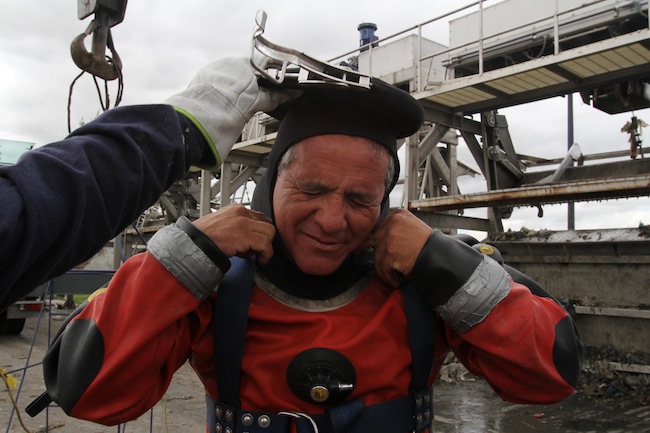At work with the sewer divers of Mexico City (photos)
JULIO Cou Cámara (see above and below) is the Mexico City sewer swimmer. He is one of a handful of divers whose job it is to free the sewers of any blockages. They earn about $500 a month.
Edible Geography reports:
“We work blindly in the black water. It contains animal poo, human poo, hospital waste… any kind of pollution you can think of…
“People often ask me what I see down there. Do I find money or jewellery? No, you can’t really see any of those things. Montezuma’s treasure may be down there, but I will most likely never find it, because you can’t see anything—all you can do is feel blockages.
“In terms of things we come across: we find lots of cigarette butts. I’ve had blockages caused by pieces of carpets, pieces of cars, or even body parts. Removing these kinds of things from the sewage is part of our work. People who work nearby or are walking past think, ‘Look at that crazy guy, he’s getting into the sewage.’ But yeah, of course—that’s just what we do.
“A normal day for me… well, what can I tell you? I go into the office, and if there are no emergencies then we work on maintaining the equipment. This equipment has to be in one hundred percent perfect condition—it mustn’t fail. My other colleague and I have our gear ready at all times. We work during the night as well as during the day. It’s not as though day or night makes a difference for us, because we can’t see anything down there anyway….
Cu has never suffered an accident, but he is haunted by the memory of a colleague who died after being swept away by the water of a reservoir 15 years ago.
So why would a man swim among other people’s waste day after day, risking his wellbeing for a modest pay? “My wife says that I work for the love of the art, but I really like my job. It’s my passion,” he said. “I’m motivated by the excitement because I never know what I’ll find down below.”
Another diver, Carlos Barrios Orta, noted:
In the darkness of the sewer, Barrios could see nothing. He doesn’t bother to carry a light, because it would be of no use in the thick waters. He inched forward in his bright red suit, an airtight model that sealed away the disease all around him, feeling his way with his rubber gloves, listening in the darkness. He could hear the powerful, whirring pump that pushed the flow through a six-foot-wide pipe. His mission was to clear away the debris around it so it wouldn’t back up into city streets. Thousands of homes have been flooded in the past by dammed-up wastewater.
“I’ve got it!” Barrios said as he pushed away bottles, plastic bags and other junk he could not identify by touch. At least there were no human bodies today, like the two he found floating by recently.
Now Barrios was singing. “I live in the water, lah-deh-dah-dum.” It was a popular children’s song, “The Pretty Little Fish,” and Barrios sang it like he couldn’t possibly have been happier. He loves his job. Two years ago, he gave up a career in accounting for this — which, he noted, says something about accounting.
The BBC went to look:
Posted: 6th, September 2013 | In: Money, Reviews Comment (1) | TrackBack | Permalink





